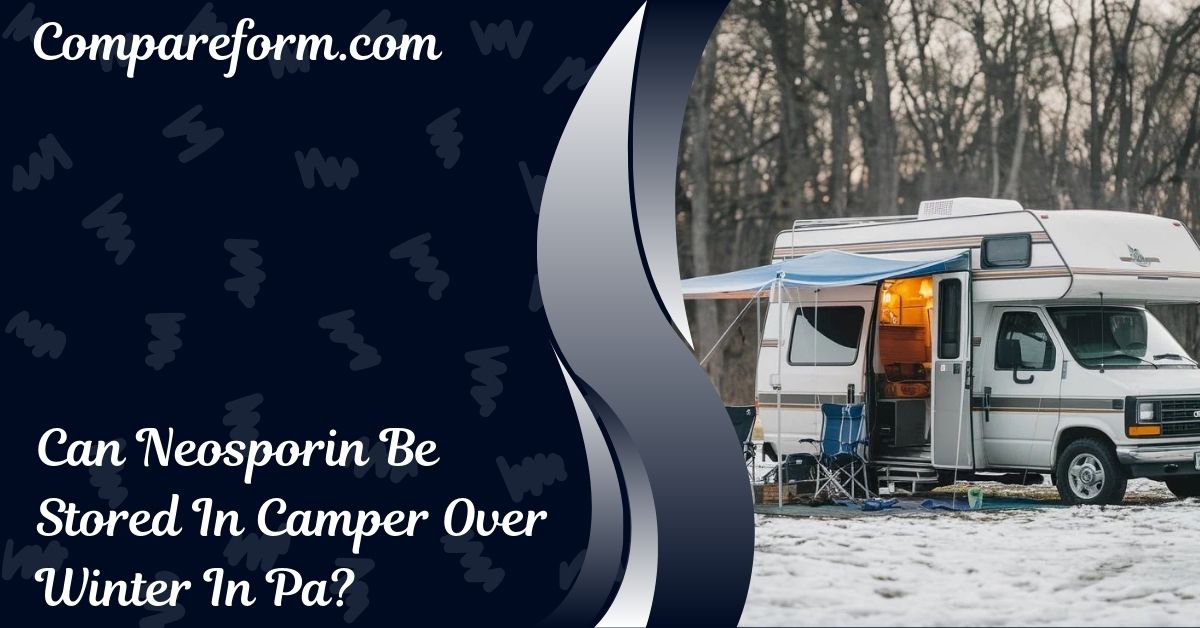Can Neosporin Be Stored In Camper Over Winter In Pa? – Complete Guide For Winter Storage
When it comes to storing essential medical supplies, such as Neosporin, you want to ensure that they remain effective and safe to use. But can Neosporin be stored in a camper over winter in Pennsylvania (PA), where temperatures can fluctuate from freezing cold to mild, depending on the weather?
In this comprehensive guide, we’ll delve into the best practices for storing Neosporin and other ointments in a camper during winter months. This article goes beyond the standard advice to give you practical insights, easy-to-follow tips, and detailed explanations to help you make an informed decision about your first aid storage.
Introduction
If you’re asking, “Can Neosporin be stored in a camper over winter in PA?”, you’re likely preparing for a cold Pennsylvania winter while keeping your emergency supplies close.
Campers, RVs, and other mobile homes are often used for extended camping trips, hunting excursions, or even as secondary homes. However, temperature-sensitive items like medical ointments require special care when stored in these environments.
In this article, we’ll take an in-depth look at the science behind storing Neosporin in cold temperatures, how Pennsylvania’s winter weather plays a role, and the best ways to ensure that your medical supplies remain effective throughout the winter.
What is Neosporin and Why is It Important?
Neosporin is a popular over-the-counter antibiotic ointment used to prevent infections in minor cuts, scrapes, and burns. It contains a combination of three antibiotics—bacitracin, neomycin, and polymyxin B—working together to kill bacteria and speed up the healing process.
People keep Neosporin on hand because it’s an essential part of any first-aid kit. However, like most medications, Neosporin can be sensitive to temperature changes.
To maintain its effectiveness, the ointment needs to be stored under controlled conditions. So, can Neosporin be stored in a camper over winter in PA without degrading?
Can Neosporin Be Stored in a Camper Over Winter in PA?
The short answer is: it’s possible, but not ideal. Neosporin is best stored at room temperature, typically between 68°F and 77°F (20°C to 25°C). However, when it comes to winter in Pennsylvania, temperatures can easily dip below freezing, which may affect the ointment’s quality.
In general, storing Neosporin in a cold camper without insulation or temperature control is not recommended. If you plan to leave Neosporin in your camper during the cold months, you’ll need to take extra precautions, such as using an insulated container and monitoring the temperature regularly.
The Impact of Temperature on Neosporin’s Effectiveness
The active ingredients in Neosporin are sensitive to extreme temperatures. Exposure to freezing conditions can cause the ointment to separate, thicken, or become less effective. On the other hand, extreme heat can degrade the antibiotics, making them less potent.
Pennsylvania winters can reach freezing temperatures or below, especially in rural areas or in higher elevations. If Neosporin freezes, it may no longer work as well when applied to cuts or scrapes, defeating its primary purpose.
Pennsylvania’s Winter Climate: What You Need to Know
Pennsylvania is known for its cold and unpredictable winters. The state experiences various winter conditions depending on the region. In the mountains and rural areas, winter temperatures can plummet well below freezing. Cities like Pittsburgh and Philadelphia may see milder winters, but freezing temperatures are still common.
The harsh conditions in PA make storing temperature-sensitive items like Neosporin in a camper during winter more challenging. Overnight temperatures can dip, causing items inside the camper to freeze, while warmer daytime temperatures may cause fluctuations.
Why Temperature Control is Crucial in Storing Neosporin
Neosporin is stable under standard room conditions, but temperature fluctuations can alter its chemical composition, reducing its effectiveness. For best results, the ointment should be stored at room temperature, away from excessive heat or cold. When stored improperly, Neosporin may not work as intended, putting you at risk of infections from untreated cuts and scrapes.
Storing Neosporin Safely in a Camper: Best Practices
Using Insulated Containers
If you must store Neosporin in a camper during winter, use an insulated container to protect it from extreme cold. Insulated containers help maintain a stable internal temperature, reducing the risk of the ointment freezing.
Monitoring Temperature with Thermometers
A simple way to keep track of the temperature inside your camper is by using a thermometer. Consider purchasing a thermometer with a remote sensor so you can check the temperature without physically being in the camper.
Using Electric Heaters
If your camper has access to electricity, you can use a small electric heater or heated storage compartment. Keep in mind that running a heater may not be practical if your camper isn’t connected to a power source for extended periods.
Potential Risks of Storing Neosporin in Freezing Conditions
One of the biggest risks of storing Neosporin in freezing conditions is that the ointment may no longer work as intended. When Neosporin freezes, the ingredients can separate, become clumpy, or degrade, resulting in less effective wound care. The risk is even greater if the ointment goes through repeated freeze-thaw cycles, which can further compromise its quality.
Alternatives to Storing Neosporin in a Camper
If storing Neosporin in a camper over winter seems too risky, consider these alternatives:
- Store it in a temperature-controlled location: Keep your Neosporin and other temperature-sensitive medical supplies in your home or a heated location.
- Portable first-aid kit: Keep a small, insulated first-aid kit that you can carry with you, ensuring your ointment stays at room temperature.
- Purchase single-use packets: Neosporin comes in single-use packets, which can be easier to manage. You can store a few packets in an insulated container while keeping the rest at home.
Additional Medical Supplies to Consider Storing Safely
Along with Neosporin, other medical supplies also need special storage in cold weather. Some of these include:
- Hydrocortisone cream: Used for skin irritation and rashes.
- EpiPens: For those with severe allergies, EpiPens must be stored within specific temperature ranges to remain effective.
- Pain relievers: Many over-the-counter pills like ibuprofen and acetaminophen should not be exposed to freezing conditions.
Expert Opinions on Neosporin Storage
Medical experts generally recommend storing medications, including Neosporin, at room temperature. According to pharmacists, exposing medications to freezing temperatures can cause their components to break down, making them less effective.
In cold climates like Pennsylvania, you should be extra cautious. Dr. Emily Simmons, a pharmacist, advises, “If you’re storing medication in an environment with fluctuating temperatures, like a camper, it’s crucial to use insulation and monitor the storage conditions closely.”
Can Neosporin Expire Faster in Cold Conditions?
Yes, Neosporin can degrade faster if stored improperly. While cold temperatures may not necessarily “expire” the ointment, they can compromise its effectiveness. Freezing and thawing cycles can cause changes in the texture, potency, and overall quality of the ointment.
Always check the expiration date on the packaging before use. If the Neosporin has been exposed to extreme conditions, it may be wise to replace it even if it hasn’t technically expired.
Storing Other Medicines in Your Camper Over Winter
Alongside Neosporin, many other medications may need special care in winter storage. Pills, creams, and liquids can all be sensitive to temperature fluctuations. When storing these in your camper, use similar precautions to those outlined for Neosporin, including insulation and temperature monitoring.
FAQs
1. Can Neosporin be frozen and still be effective?
No, freezing Neosporin can alter its chemical composition, reducing its effectiveness. It’s best to store it at room temperature.
2. How can I tell if Neosporin has gone bad?
Look for changes in texture, color, or consistency. If the ointment has separated, become clumpy, or has a strange odor, it’s best to discard it.
3. What temperature should Neosporin be stored at?
Neosporin should be stored at room temperature, ideally between 68°F and 77°F (20°C to 25°C).
4. Can I use Neosporin after the expiration date?
It’s not recommended to use Neosporin after the expiration date. The efficacy and safety may be compromised.
5. Is it safe to store other medications in a camper over winter?
Similar to Neosporin, many medications can degrade in extreme temperatures. It’s best to store them in a temperature-controlled environment.
Conclusion
So, can Neosporin be stored in a camper over winter in PA? While it’s possible with the right precautions, it’s not the ideal situation. The best way to ensure the effectiveness of Neosporin and other medical supplies is to store them in a temperature-controlled environment.
By understanding the impact of temperature on Neosporin and implementing best storage practices, you can help ensure that your first-aid supplies remain effective for all your winter adventures.






